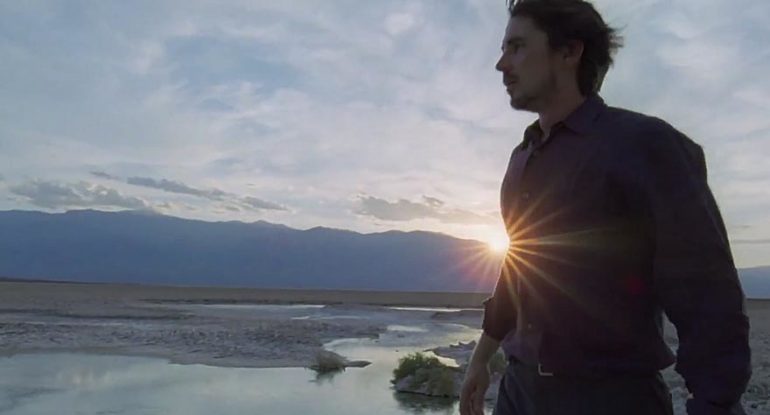Knight of Cups opens on the awe-inspiring sight of the aurora borealis from space, while we hear narration from the late Sir John Gielgud reading from John Bunyan’s The Pilgrim’s Progress on the soundtrack. Like Bunyan’s opus, Terrence Malick’s latest charts the journey of its hero (named Christian in the book, with Malick’s surrogate played by Christian Bale in a surfeit of serendipity) from the depths of sin to “safe arrival at the desired country.” It certainly captures the ardour of such a journey; it’s fraught with questions, plenty of which go unanswered, and littered with distracting characters at once obstinate, pliable and wanton. Right from the start, it’s a voyage through a pretty landscape, but the climate is distractingly humid, toploaded with hot air.
For the sake of full disclosure, this reviewer saw Knight of Cups legally on a big screen. Yet even before the film ‘leaked’ online (The leaked copy came from a legally downloaded version, originally from iTunes, hence the inverted commas), the chances of seeing Malick’s oh-so-tasteful L.A. commentary in any public arena were gradually slimming. The official synopsis proved to be both vague and overly reductive, already pitching the film at the level of a Zen riddle. A dazzling trailer was counteracted by mixed buzz after the film’s Berlinale bow. Cue nearly a year of flapping limply around the festival circuit, and it’s now getting a staggered Blu-Ray release. After the indifferent passing of To The Wonder, perhaps another grand folly played out in public was too much to bear for ol’ Terry Malick. On this evidence, he only has himself to blame.
Bale plays Rick, who works in Hollywood, though you’d have to read a detailed summary to conclude that he’s a screenwriter. He could be an actor or a director, but the film offers little context beyond the Los Angeles setting. He’s a typically dissatisfied Malick-ian soul, though there’s plenty surrounding him to serve as distractions. The trailer for Knight of Cups, with its choppy cuts, handheld cameras and nightclub footage suggested something that at least moved faster than the sun-dappled To The Wonder. The L.A. of Knight of Cups is no less sunny, which proves a contrast to so many films that are happy to mine its underbelly for a story. The sun illuminates the streets, film sets and aquaria of the city, all of which Rick visits on what is to be a long journey towards some sense of self. The film gets its title from the tarot card of the same name, whose emotional control is dependent on what way the card is turned. Rick is an upside-down card, emotionally drained and in need of calm, away from the distractions of the City of Angels. Considering that we started on with the aurora borealis, this focus seems too narrow for Malick. He reaches for the skies, for the thoughts of Bunyan and the ethereal arctic glows, but Malick’s finished product is too compartmentalized (Perhaps too compromised?) to get there.
Rick’s efforts to upright his card are framed within his meetings with various people, the angels of all shades in a city that Malick seems to think is bereft of them. Initially, Rick parties his way through L.A. as Malick and DoP Emmanuel Lubezki alternate between handheld and Steadicam, black & white and colour. The stylish look of some of these scenes is unusual for Malick, but it does help establish the hedonism of the city before he ramps his methods and message up proper. Encounters with Rick’s mistress (Imogen Poots), estranged wife (Cate Blanchett) and father (Brian Dennehy) come and go, but all with little impact. With the possible exception of Wes Bentley (as Rick’s wayward brother), the cast look lost, as if freshly awoken from sleep. The scenes become more and more Malick-ian, with muted dialogue, gliding camera sweeps back and forth, and important-sounding whispers as voiceover. We’ve been here before; the familiar methodology suggests familiar themes as well, but it never coheres into a satisfying whole. Malick covered the conflict of fathers and sons to much more staggering effect in The Tree of Life, while To The Wonder embodied the joy of love in the simple joy of Olga Kurylenko’s endless twirling through fields. Here, there’s little respite for any character, and even less for an audience.
As much as one could grumble about a similar weightlessness in To The Wonder, the characters were sufficiently engaging to keep it grounded. With less defined characters and less security in what it’s trying to say (beyond broad platitudes about the soullessness of the entertainment industry), Knight of Cups threatens to flit away long before Natalie Portman shows up in the third act to fulfil another ill-defined role. There is an argument to be made that this hollowness is part of Malick’s point. At one stage, a Las Vegas stripper tells Rick, “You can be whoever you wanna be.” Is Rick at such critical mass that he can’t identify himself or anyone else? Well, at one point, Rick wanders into a room filled with fog. Yes, Knight of Cups can be that thunderingly obvious. For a better representation of troubling identity crises, try Anomalisa; that deals with its lead character’s Fregolian dilemma in a way that’s more original and less self-parodic.

